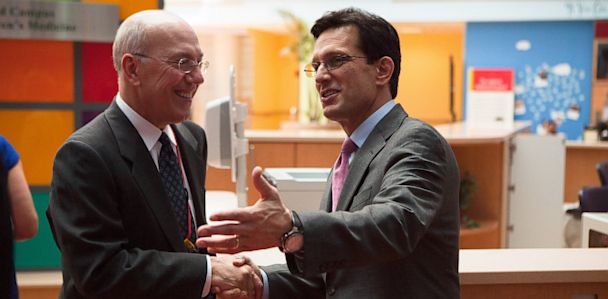Cantor Calls For Diverting Campaign Funding to Children's Health Care

WASHINGTON - In a time of continued calls for austerity, House Majority Leader Eric Cantor may have softened the Republican image this week by laying out legislation that would end taxpayer funding of presidential campaigns and party conventions and divert the money to pediatric disease research. And members of both sides of the aisle are crying foul.
Cantor and three of his Republican colleagues visited Children's National Medical Center to bring attention to the Kids First Research Act, which would divert $130 million in federal money to the National Institutes of Health to fund pediatric research for diseases including childhood cancers and autism.
"We believe in medical research and discovery and we believe that pediatric medical research is and should be a national priority," Cantor said, adding he believes it will also "address health care costs and bring them down" because the funding will help to find cures.
"In times of fiscal stress especially we are called upon in Congress to set priorities, and there are a lot of reasons why medical research and in particular pediatric research should be a priority," Cantor said, adding that the number one reason is, "It's just the right thing to do."
"It's also the right thing to do because research in this country of ours has proven to be a tremendous boon to our economy," the Virginia Republican said.
The bill was initially introduced in April on World Autism Awareness Day, with about 100 co-sponsors that included a handful of Democrats, but only Reps. Tom Cole (R-Okla.), Renee Elmers (R-N.C.) and Susan Brooks (R-Ind.), were on hand for the event. They were also joined by Redskins player Darryl Tapp, who told the crowd that seeing the kids "struggling with a lot of different issues" really "hit home."
The legislation has opponents from both sides of the aisle. Emily Goff, research associate in domestic policy of the conservative think tank Heritage Foundation, says the money should be used to pay down the deficit.
"When Rep. Cantor is talking about his policy on the floor and says legislating in times of fiscal stress is about priorities, it makes sense then to reduce the massive federal budget deficit [rather] than finding another way to spend more money," Goff told ABC News.
Goff adds that the legislation "sours what would be good policy by spending it on new programs."
Cantor countered that argument, saying at the press conference, "If you want to look at it strictly from an economic level … we all know that the driver of our debt and deficit are the unfunded liabilities connected with the entitlement programs."
"This money can actually be translated into addressing that through cures," said Cantor. "If you cure disease, you no longer have to spend dollars towards treating the disease and the patients of those diseases."
Larry Noble, the chairman of Americans for Campaign Reform, which works to keep corporate money out of politics and keep funding of federal campaigns public, called the legislation "very cynical," noting that the "money has been set up and donated for public funding by people who wanted their money to go to public funding of elections."
"The presidential public funding system is broken, no question about it, it has to be fixed, but to use this as an excuse to just end it is cynical," Noble said. "We should not pit democracy over the health of children."
Since sequestration cuts have already hit the NIH, it's likely the Democratic leadership will also oppose the legislation since those cuts are larger than the funds the measure proposes to restore to the NIH.
Cantor, his fellow lawmakers and Tap joined doctors at the hospital for a tour, as well as meeting with sick children and their families.
Dr. Mark Batshaw, the hospital's chief doctor, actually mentioned sequestration, saying the more junior physicians and scientists are those getting their grants cut and they are "really losing a whole generation of scientists because of a lack of funding." He also told Cantor that pediatric research is only 7 percent of the NIH budget.
Margaret Norris came to the event and is supportive of the legislation. Her son Joey was diagnosed with leukemia in 2008 and relapsed in 2010. Norris came out to express her support because she wants more funding of drugs that specifically help children's diseases.
"We need more research for children so we have drugs for children," Norris said. "Any money we can raise that improves drugs for children and raises awareness of pediatric cancer, and it's just one disease affecting children."
Cantor said he was trying to get the broadest support possible for the bill on both sides of the aisle and that he had spoken to Democrats in the Senate about the legislation, but not Senate Majority Leader Harry Reid.